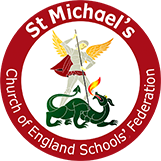History
Intent
At St Michael’s Infant School, history is fundamental. Topics will inspire and engage the children and will often be used as a stimulus in other areas of the curriculum, such as in writing. Across the school year, all year groups from Year R to Year 2 will study the same core historical skills, concepts and processes at the same time. Each of these builds upon the last and becomes increasingly more complex, utilising higher level thinking as the year progresses. Teachers will work collaboratively, with the support of the progression document, to ensure that children’s knowledge is being challenged as they progress from Year R to 2. The core skills, concepts and processes are outlined below.
|
Term 1&2 |
Historical Enquiry Interpreting History |
|
Term 3&4 |
Significance Similarities and Differences Continuity and Change
|
|
Term 5&6 |
Continuity and change Cause and Consequence
|
|
Term 1&2 |
Ask and answer questions
|
|
Term 3&4 |
To know about the lives of significant individuals in the past. Identify similarities and differences between ways of life in different periods. |
|
Term 5&6 |
To know about the lives of significant individuals in the past who have contributed to national and international achievements. |
This structure would be repeated for each Year group but by building on previous learning, the children will develop a more sophisticated understanding of each concept as they move through the school.
At St Michael’s, we aim to provide the children with historical skills, such as critical thinking, reasoning, questioning and evaluating amongst others. We foster curiosity in our children by encouraging them to generate their own questions that they would like to answer about each topic. By Year 2, our children will begin to independently transfer these skills, not only to other historical eras, but to other subjects across the curriculum. They will use historical vocabulary to express their ideas and to recognise and present these creatively.
Implementation
Lessons will be immersive, active and varied. ‘Wow Days’, alongside active lessons, inspire the children and allow them to retain knowledge in their long term memory. Subject specific vocabulary will be displayed in the classrooms and will be specifically tailored to each year group to ensure progression. This vocabulary will be referred to during ‘flashback sessions’ in lessons. Teachers will encourage the children to make connections and see the bigger picture. The school environment will be history rich through working walls, resources and vocabulary. Timelines displayed in every classroom allow the children to independently look back at their previous learning.
Impact
Assessment is ongoing through every lesson through verbal feedback and class discussion. Pupil voice is utilised every lesson to capture each child’s understanding of the topic and challenge any misconceptions as they arise. In discussions with the teacher children will be encouraged to use the correct historical vocabulary. When appropriate, written work will be recorded in writing folders or the floor book allowing children the opportunity to express their ideas. Each term, teacher assessment takes place and the subject leader is provided the names of children requiring next steps.
 St Michael’s C of E Infant School
St Michael’s C of E Infant School